Posted by Elena del Valle on February 1, 2012
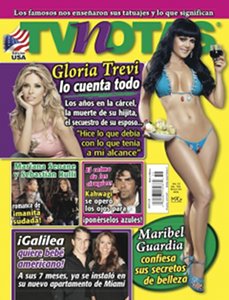
TVNotas USA cover February 2012
Photo: Maya Publishing Group
In 2010, TVNotas USA, a weekly Spanish language editorial gossip magazine launched in 1999 in the United States and sold mainly at newsstands, had a circulation of 150,000. Due to the economic downturn the magazine reduced publication to twice a month (26 issues per year) in November 2010 (see Maya institutes publication changes effective immediately). By 2011, circulation had increased to 220,000 boosting the magazine’s points of distribution nationally.
Sales rose 18 percent between 2010 and 211, marketing staff believe, due in part to the lesser frequency of publication which provided more exposure time, and the added points of distribution. TVNotas USA targets Spanish dominant women 18 to 44 years of age and publishes 1.2 million magazines per year with an estimated reach of 7.9 million thanks to a pass along rate of 6.4. More than 50 percent of the readership is of Mexican origin.

Jusmir Gonzalez, editor, TVNotas USA
The magazine’s 96 interior pages and four cover pages are divided into 70 percent editorial content and 30 percent ads. Editorial, produced in the United States and Mexico, is 57 percent entertainment; 11 percent each celebrity interviews, fashion and beauty, and lifestyle; and 5 percent each food and recipes and other content. Jusmir Gonzalez is the new editor of the magazine.
The magazine also has an online presence, tvnotasusa.com, with frequent updates published by Grupo Editorial Notmusa of Mexico, the parent company of Maya Publishing Group. The website had an audience of one million its first year of operations.
Comments:
Filed Under: Media
Posted by Elena del Valle on January 30, 2012

Angelica Perez, Ph.D., publisher, NewLatina.net
Photo: Angelica Perez, Ph.D.
A podcast interview with Angelica Perez, Ph.D., publisher, NewLatina.net is available in the Podcast Section of Hispanic Marketing & Public Relations, HispanicMPR.com. During the podcast, Angelica discusses New Latinas with Elena del Valle, host of the HispanicMPR.com podcast.
Angelica is a clinical psychologist by profession, with 16 years of experience as a counselor and therapist, anchoring her work on women empowerment. Formerly a research assistant professor at New York University School of Medicine, Angélica is in private practice in New York. She is the first Latina iVoice on iVillage.
To listen to the interview, scroll down until you see “Podcast” on the right hand side, then select “HMPR Angelica Perez, Ph.D.” click on the play button below or download the MP3 file to your iPod or MP3 player to listen on the go, in your car or at home. To download it, click on the arrow of the recording you wish to copy and save it to disk. The podcast will remain listed in the January 2012 section of the podcast archive.
Posted by Elena del Valle on January 27, 2012
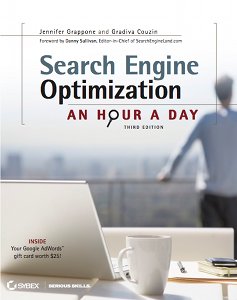
Search Engine Optimization book cover
Photos: Jennifer Grappone, Gradiva Couzin
Jennifer Grappone and Gradiva Couzin make their living as partners of a California search engine optimization and social media consulting company. They dedicated six months to writing a book about what they do for clients. Two updates followed, each one requiring about six months to achieve. In the third and most recent edition of Search Engine Optimization An Hour A Day (Wiley, $29.99), published in 2011, they outline their thoughts on the subject starting with a basic explanation in the first chapter and making their way slowly to the final tenth chapter where they suggest supplemental ideas in Extra Credit and Guilt-Free Slacking. Every section was updated and the authors added more information on social media, online reviews, and local search optimization.
“The tactics laid out in the book can apply to any site, and we have customization tips dedicated to many types of companies, from one-person shops to large B2C or retail sites. We hear from readers in a wide range of industries and organizations large and small, however we think our book is probably most popular with small business owners,” said Couzin by email in response to a question about their target audience. “The book definitely has some readers in the over-50 crowd who might be turned off by more technical books, and we also hear from readers in their 20s who are just getting started in online marketing. We’ve also learned that the book is being used as a textbook for college-level marketing courses, which is exciting!”
Along the way they address large, small and really small companies and their needs in the 408-page softcover book divided into three parts. In Chapter 4, for example, they discuss current search engine procedures and emphasize the importance of building a visitor centered website without obsessing about search engines. Success with search engines and clients remains part science and part art, according to them.

Gradiva Couzin, co-author, Search Engine Optimization
“There is no such thing as ‘set it and forget it’ with SEO and social media.You have to keep updating your site, generating excellent content, building relationships, and trying new strategies to keep ahead of your competitors. This is particularly true with regard to social media, you have to be open to new strategies and constant testing,” said Couzin.

Jennifer Grappone, co-author, Search Engine Optimization
In the book, the authors point out what they consider the most important factors that may lead to high search engine placement: incoming links and link text, the standing of the site, the title of the page in HTML code, HTML text visible on a page, how old a domain is, being the first publisher of the content and having fresh content or updates and the loading speed of the site.
They also discuss search ranking factors, paying for placement, and trend spotting. Other chapters address the importance of team work, a monthlong plan for three months, and options to lower the workload while maximizing results.
Before turning her efforts to search engines in 2000 Grappone was a web project manager and video producer. Couzin, a civil engineer and programmer, started working with search engine optimization a year before her colleague.

Click to buy Search Engine Optimization (SEO)
Comments:
Filed Under: Books
Posted by Elena del Valle on January 25, 2012

Many people surveyed recently said they love coffee
Photos: Simon & Baker, Starbucks/Business Wire
Americans love their coffee. Forty percent of coffee drinkers that responded to a survey recently said they couldn’t live without coffee, even for a week, when compared to a cell phone, romance, sports, and social networking. Forty percent of the survey takers said coffee was more important than showering when asked about their daily routines, according to Starbucks U.S. Regional Roast Preferences Study, Dec. 2011*.
Although the total sales of coffee in 2010 (about $7.6 billion) were 3.7 percent higher than in 2009 and retail sales in 2011 were expected to reach $8.5 billion, representing a 12 percent rise, the increase is due to higher coffee and commodities prices rather than higher consumer consumption, according to Coffee US October 2011 Executive Summary from Mintel.

Starbucks Blonde Roast Coffee, available beginning January 10, 2012
Marked increases in commodity prices, the price of coffee beans, energy and other commodities that are needed to transport coffee and market it in retail outlets, were behind the raise in coffee prices. Almost half (48 percent) of coffee drinker respondents to the Mintel report said they are “drinking more coffee at home and less coffee away from home this year than last year.” Mintel researchers believe that trend will probably continue through 2012.
At home consumption of coffee may be tempered by dissatisfaction regarding choices on the part of some consumers. One of every four shoppers leave the coffee aisle without buying coffee because “either they can’t find what they’re looking for, or the premium coffee section doesn’t make sense to them,” according to a Starbucks press release this month citing SmartRevenue Coffee/Tea Aisle Path to Purchase Research, May 2011*.
Given the flat sales it may be that coffee makers and sellers are trying to expand their market share. Starbucks seems to be. The international coffee mega brand known for its medium and dark roast coffee launched Starbucks Blonde Roast Coffee, a new light flavor, January 10, 2012 hoping to capture part of the 54 million coffee drinkers domestic market who say they prefer a lighter roast coffee (Starbucks Consumer Research 2010*).
“It took eight months and more than 80 different recipe and roast iterations before we landed on the exact flavor profile our customers told us they were looking for,” said Brad Anderson, master roaster, Starbucks.

Brad Anderson, master roaster, Starbucks
“Starbucks Blonde Roast is our answer to providing a premium lighter roast coffee to appeal to those that describe Starbucks signature roast as too intense,” said Jeff Hansberry, president, Channel Development for Starbucks. “This new roast profile will allow us to increase our share of the brewed coffee market down the grocery aisle where a majority of coffee sales are in the light and medium roast categories. This segment of the market represents a $1 billion opportunity for the company in the U.S. alone.”
It’s no accident Starbucks is banking on another variety of roast coffee. Roasted coffee remains king. Retail sales of roasted coffee reached nearly $5.9 billion in 2010, representing a 4 percent increase from the previous year while instant coffee sales rose 0.5 percent and ready to drink coffee sales grew 5.2 percent during the same time period, according to Mintel. The research company’s experts anticipate that the roasted category will be the primary driver of sales gains in 2011.
*A Starbucks spokesperson declined to provide copies of the reports or the executive summaries of the reports. Instead she indicated by email that the “Data was collected from a U.S. Census representative sample of Americans ages 18+.”
Posted by Elena del Valle on January 24, 2012
Information provided by Event Partner

2012 Billboard Latin Music Conference & Awards
April 23-26, 2012 Miami, FL
Every year, the biggest names in Latin music come together for the most anticipated event of the year – The Billboard Latin Music Conference and Awards. Now in its 23rd year, the Conference unites the most extraordinary people in the world of Latin music and entertainment – including the industry’s hottest artists, major record label execs, cutting-edge brand marketers, national radio programmers, world-renowned producers, revolutionary digital music execs – and many more. Join Billboard and celebrate and explore the issues that make this the most exciting industry in the world. Use promo code HMPR12 to get 20% off the current registration rate at www.billboardlatinconference.com
Posted by Elena del Valle on January 23, 2012

The cast of Melodia de Amor on Tutele
Photos: Tutele/Maker Studios
In November 2011, Maker Studios, owned by “top YouTube stars,” backed by venture capital firms and funded by YouTube as an Original Partner, began targeting Latinos in the United States, Mexico, South America and Spain with The Tutele Network, Tutele and Tutele Dos, on YouTube. The two channels, youtube.com/tutele and youtube.com/tuteledos, offer three original bilingual English and Spanish web programs each per week. Tutele.tv, a similarly named website, is not affiliated with the Network. Plans are in place to develop a website for The Tutele Network.
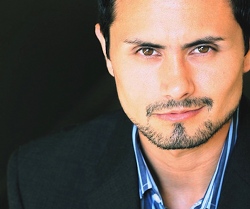
Jay Bugarin, head, Bilingual Programming Tutele/Tutele Dos
“Tutele is our main hub, currently our programming consists of our action/comedy show Si, es I, Pepe, the novela Melodia de Amor and our own News, Variety and Entertainment show Hello Domingote,” said Jay Bugarin, head, Bilingual Programming Tutele/Tutele Dos. “Tutele Dos has extras such as behind the scenes videos, interviews with our talent, and ‘confessionals’ from the characters of the shows. This will give our viewers a front row seat to the interesting world of our creative talent and to the many adventures of our unique team.”
“Our content gets monetized through adsense, sales, brand integrations, product placement, etc. We work closely with YouTube in relation to potential brand integration that may be fitting for our network,” he replied when asked how The Tutele Network, generates revenue.

Sam Macaroni as the evil “El Jefe” on the action comedy show Si! Es I, Pepe
Tutele, the net’s main portal, and Tutele Dos, its ancillary content portal, have programming in Spanish, English and Spanglish. Tutele has 12 online channels and two hub channels. The network’s focus is cultural programming for young and adult Latino audiences. Executives plan to broadcast behind-the-scenes videos, interviews with network talent and guest stars, and “confessionals” from characters of the shows on the network on Tutele Dos. Also, The Tutele Network partnered with already established and successful online channels aimed at the Latino community.
According to promotional materials, Maker Studios is an online media company featuring content from KassemG, The Game Station, NicePeter’s Epic Rap Battles of History, the ShayTards, LisaNova and Ray William Johnson. Maker Studios boasts of having over 500 million views online per month. The company, which produces and distributes content for 250 online channels with 31 million subscribers and 1.8 billion views, produces or manages and distributes 16 of the top 20 channels on YouTube.
Posted by Elena del Valle on January 20, 2012

Los Kennedys, a miniseries with Spanish language voiceovers
Photos: Vme
Beginning at 10 p.m. January 30 Vme will air Los Kennedy, an eight-part Emmy award-winning miniseries, for the first time with Spanish-language voiceovers. The Kennedys series, starring Greg Kinnear, Katie Holmes, Barry Pepper and Tom Wilkinson, first aired in the United States in English last year on the ReelzChannel. The final 60-minute segment will air March 19, 2012.
Marian de la Fuente, Vme host and news anchor, will introduce the episodes, highlighting events of historic interest to the Spanish language preferring audience and speculating on how she believes the events depicted in the series may impact viewers lives today. Catherine Siachoque, a Colombian actress, lent her voice for the Spanish-language voice of Jackie Kennedy. Julio Bracho was the Spanish language voice of John F. Kennedy and Gabriela Vergara the voice of Marilyn Monroe.
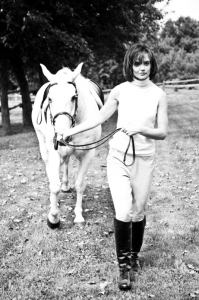
“Jackie Kennedy” in Los Kennedys
Los Kennedy explores the events that shaped the infamous Kennedy dynasty from the 1930s to 1968, including the patriarchal attitudes and tactics of Joe Kennedy, John’s first run for Congress, the death of Joe Jr., Robert’s loyalty to John’s political career and John’s marriage to Jacqueline Bouvier, ending with the assassinations of John F. Kennedy in 1963 and Robert F. Kennedy in 1968.
The miniseries was produced by Muse Entertainment (Human Trafficking, Pillars of the Earth) and written by the producers and writers of 24, Steve Kronish and Joel Surnow. The Kennedys series met heavy resistance from the inception of the project and early scripts were criticized by former colleagues of President John F. Kennedy and some guardians of his legacy.
This year, according to Vme promotional materials, Los Kennedy has been nominated for Outstanding Achievement in Cinematography in Movies of the Week/Mini-Series by the American Society of Cinematographers, the 2012 Producers Guild Award. Jon Cassar, the director, was nominated for the Directors Guild Award.
Vme, a 24-hour Spanish language network partnered with public television stations, is available free over-the-air, and on basic digital cable nationally via satellite; in the basic and Hispanic packages of Dish Network and DirecTV and on Verizon FiOS and AT&T U-verse.
Posted by Elena del Valle on January 18, 2012
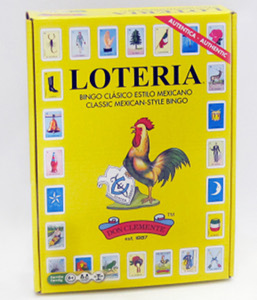
Loteria, a bilingual board game, will be available in the United States in Spring 2012
Photos:G.S. Schwartz & Co. Inc.
Techno Source, a division of LF Products, and FremantleMedia Enterprises (FME), the commercial and brand extension of FremantleMedia, expect to sell to Mexican Americans “hundreds of thousands of units a year” of Loteria, a $5.99 board game that is popular in Mexico. Loteria is Spanish for lottery.
Toward that end and assuming the country’s large Hispanic population will be interested in their new product last month they announced a licensing agreement whereby Techno Source will sell Loteria board games made in Shanghai, China in the United States. The game is expected to arrive at mass and specialty retailers in spring 2012.
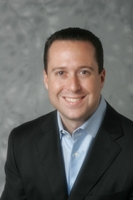
Eric Levin, division head, Techno Source
“The primary market for Loteria is the Mexican-American population. It is such an iconic game that anyone with Mexican heritage knows and loves from childhood. Now they can easily buy Loteria for their families here in the USA and pass along this great tradition,” said Eric Levin, division head, Techno Source when asked about the target audience for Loteria. “Additionally, it is a great family game, appropriate for everyone ages 6 and up. It includes English and Spanish translations, so it’s easy for those who are fluent in either language and also a great teaching tool for those who wish to learn. Techno Source has been tracking the growth in the Hispanic population and hearing steady feedback from our retail partners that they are looking to better serve this population in their stores. This was a natural fit and is and great way to bring an extremely well known product to the US market.”
According to promotional materials, Loteria originated in Italy in the 1400s and was introduced to Mexico in 1769 where it became very popular. Loteria is a bingo style game of chance that uses colorful, iconic images of Mexican culture on playing cards instead of numbers on ping pong balls.

Naz Cuevas, senior manager, Consumer Products, FME
“We are excited to work with Techno Source to bring the Loteria family board game with its deep cultural roots and recognizable imagery to families in the U.S.” said Naz Cuevas, senior manager, Consumer Products, FME. “Their marketing expertise and vast distribution network will allow us to reach the young Hispanic market, the fastest growing segment in the U.S. with more than 44 million people, and also broaden the audience for this historic brand.”
Techno Source, a division of LF Products and part of Li & Fung Limited, is one of the fastest growing global toy companies. The Techno Source game portfolio includes 20Q, Tetris, Disney, Rubik’s, Nickelodeon, Bicycle (The United States Playing Card Company), Intellivision, Guess What I Am!, and Electronic Touch-Screen Sudoku.
FremantleMedia Enterprises is a full-service brand building company that specializes in rights management and exploitation across multiple platforms such as consumer products, sponsorships, interactive and mobile, and live events. FME’s portfolio of third-party brands includes Rebecca Bonbon, a girls fashion brand designed by Yuko Shimizu, the original creator of Hello Kitty; Endless Summer, a beach culture and lifestyle brand inspired by the 1964 cult classic film; Condè Nast lifestyle brands Self and Epicurious, and Bellator, a mixed martial arts fighting championship brand.
Posted by Elena del Valle on January 16, 2012
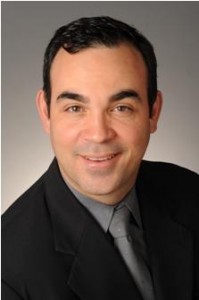
Roberto Perez, director, Hispanic Marketing, Comcast Cable
Photo: Comcast Cable
A podcast interview with Roberto Perez, director, Hispanic Marketing, Comcast Cable, is available in the Podcast Section of Hispanic Marketing & Public Relations, HispanicMPR.com. During the podcast, he discusses his company’s Hispanic market strategies with Elena del Valle, host of the HispanicMPR.com podcast.
Roberto responsible for developing and executing marketing initiatives aimed at attracting and retaining Hispanic customers by maximizing internal sales channels and partner relationships to create complete end-to-end products and programming that resonate with and better serve this audience.
He also oversees Comcast’s On Demand platform En Español and provides marketing strategy for xfinityTV.com/latinoTV, the company’s Spanish language online entertainment portal. Prior to joining Comcast in 2010, Roberto served as manager of Multicultural Strategy for Cox Communications and before that he was project manager for the Mexican-American Business Chamber in Atlanta.
To listen to the interview, scroll down until you see “Podcast” on the right hand side, then select “HMPR Roberto Perez” click on the play button below or download the MP3 file to your iPod or MP3 player to listen on the go, in your car or at home. To download it, click on the arrow of the recording you wish to copy and save it to disk. The podcast will remain listed in the January 2012 section of the podcast archive.
Posted by Elena del Valle on January 13, 2012

Violencia Doméstica book cover
Photos: Concordia Publishing House
In past years, nearly one in four adult women and one in nine men in the United States have reported experiencing intimate partner violence (IPV) at some point in their lives; among Hispanics 20.5 percent of women and 15.5 percent of men suffer partner violence; and 85 percent of domestic violence victims are women and 25 percent of women who attempt to escape from batters are murdered, according to Intimate Partner Violence, Bureau of Justice Statistics Crime Data Brief 2003 and CDC Behavioral Risk Factor Surveillance System Survey 2005.
Between 1995 and 2008, while Celso William Chignoli was senior pastor of Scruggs Memorial United Methodist Church and senior pastor of the United Methodist Church of the New Community he established La Clinica, a health program that provided medical, dental, psychological, and social work services free of charge to 1,200 patients a month. Eighty-five percent of those were migrant or undocumented workers who could not afford to pay for their health care.
Among the patients there were people who exhibited complications associated with domestic violence, both victims and victimizers. This led him to research the topic and offer specialized courses for pastoral care and counseling in the summer class programs at Perkins School of Theology, Concordia Seminary and elsewhere.
He wrote about the subject initially for seminarians, pastors and church ministries. Then he directed his attention to victims in Spanish in Violencia doméstica: Detección, prevención, y ayuda (Editorial Concordia,$8.99), to help them gain insights to overcome this situation without serious problems. He also directed the 126-page softcover book to pastors and future pastors believing that if they understand domestic violence they can be prepared, prepare their congregation, and have the option to establish a restorative ministry.
The statistics are daunting: 75 percent of fatalities occur when a victim announces she or he will leave or end the relationship. Chignoli believes it is better to leave without an explanation, and learn to heal.
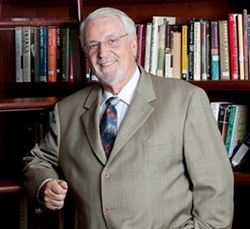
Celso William Chignoli, author, Violencia Doméstica
Domestic violence is taboo within Hispanic households and other groups, according to the author, because it is “rooted in anger and the lack of ability to manage that anger.” The presence of aggression, violence and sexual abuse in the media; the fact that in the majority of Latin American and Spain there are no protective laws and have not developed a sense of respect towards women, according to him, are other contributing factors. Discrimination, he says, is also common, although 17 percent of domestic violence victims are men. Often, according to him, Hispanic women cling to chauvinist customs and when a woman does not submit to her partner’s needs, it can escalate to death.
According to Chignoli a large percentage of Hispanics do not have access to a computer and do not have education or resources in Spanish; and Latino communities in the United States may feel “disconnected to reality because of the lack of solidarity and participation in education campaigns regarding mutual respect in relationships.” He believes by speaking out against domestic violence, creating awareness, and taking action people can fight domestic violence.
Chignoli studied medicine at the Universidad Nacional de Cordoba in Argentina and received his graduate degree in divinity from Eden Theological Seminary in Saint Louis, Missouri. Editorial Concordia, the Spanish division of Concordia Publishing House is a not-for-profit publishing company and the publisher of The Lutheran Church—Missouri Synod.

Click to buy Violencia Domestica
Comments:
Filed Under: Books
































